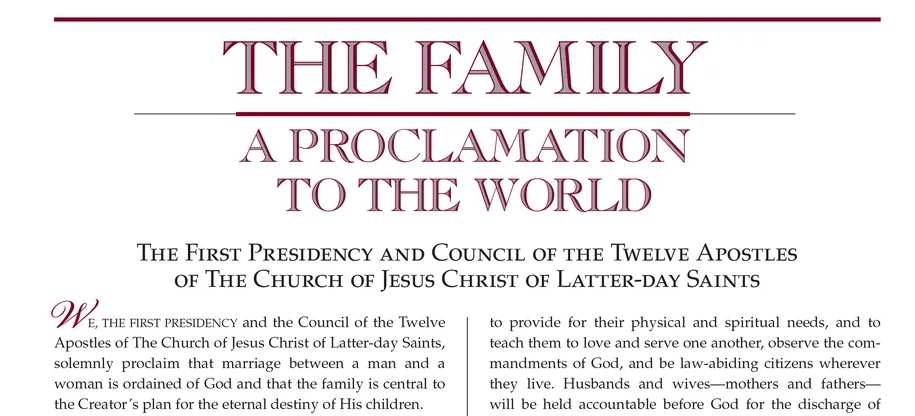The Proclamation Is a Light Against Sophistry
by Cassandra Hedelius

In September 1995, President Hinckley used a big word. “With so much of sophistry that is passed off as truth, with so much of deception concerning standards and values, with so much of allurement and enticement to take on the slow stain of the world, we have felt to warn and forewarn.” He then presented the new Proclamation to the World.
“Sophistry” isn’t an accusation we hear often, and I pretty much knew what it means but I’m glad I looked it up because it’s more descriptive than I realized. It means using fallacies–arguments that don’t hold up under careful examination–to deceive others. The original sophists were ancient Greek professional teachers who made a living by instructing politicians and nobles, and publicly lecturing and debating. They purported to teach truth and wisdom, and perhaps many were sincere and wise. But I think the incentives of their position would have made it really difficult to be single-mindedly devoted to truth.
Sophists’ livelihoods depended on being popular. They would only be paid to teach if their customers liked what they taught. I don’t think many in that position could resist boosting their popularity by flattering their audiences, claiming to be morally superior to those who disagreed with them, and accusing their opponents of being harmful.
The Sophists would have done gangbuster business on social media. Though much of it is devoted to non-intellectual topics like fashion, even fashion influencers are constantly taking moral stances (Exhibit A: Kim Kardashian successfully lobbied the president on criminal sentencing reform and is studying for the bar exam). And many of the influencers are popular specifically for their moral/intellectual/philosophical teachings, and some even more specifically for an LDS audience.
This audience, that I sometimes think of in shorthand as “Instagram moms,” can easily think they’re consuming purely sincere arguments that are intended solely to help others and improve the world. But they’re not. Everything is for sale on social media, most especially our attention and enthusiasm. Controversy sells; accusation increases engagement. (One reason I like volunteering for FAIR is that a lot of our output is anonymous, which blunts the temptation to become popular, and that no one is paid except a couple of operations professionals.) And context is dispensable: I’ve seen so many people “like” an argument that depends on just a few words, when reading the entire paragraph would have totally negated their point.
Many of the prominent influencers directed at LDS audiences are sophists. Even if they truly believe their arguments, they’re caught in a feedback loop of popularity, insularity, and accusation against any deviation from the prevailing moral consensus. This is especially true with regard to sexuality and family. Their arguments don’t stand up to rigorous examination, but their audiences don’t realize this, because critics are dismissed with emotionally loaded accusations of “bigotry” and “causing suicide.” (Data does not show that believing and speaking in favor of chastity and the traditional family causes LGBT suicides, and the accusations are callously irresponsible because they could cause suicide contagion.)
President Hinckley was precisely accurate in anticipating the social media dynamic: arguments crafted in order to deceive are passed off as truth, and we’re allured and enticed (and flattered) to slowly incorporate the world’s philosophy into our worldview and moral judgments. I’m grateful that he prophetically warned and forewarned us by proclaiming a concise, clear, powerful statement of essential truth.
Don’t get hung up on the argument that the Proclamation isn’t authoritative because it isn’t canonized: ignoring the united statement of all fifteen prophets, seers, and revelators is a dangerous rationalization. We should be gratefully receiving the word of the Lord through His servants, not looking for reasons to dismiss it.
Don’t fall prey to clever arguments that talk around the Proclamation. I’ve seen activists argue:
- God said that “marriage between a man and a woman is ordained of God,” but that doesn’t mean other kinds of marriage aren’t also ordained of God. This is disingenuous, because people making this argument will often also argue against the Proclamation on the grounds that it was specifically aimed as a weapon against gay marriage–which is partially true. Marriage is between a man and a woman. That’s it’s definition in all of scripture and all prophetic teaching. There has never been the slightest indication that God honors any other form of marriage. And those who say we’re on the verge of getting new revelation upending the 100% consistent understanding of marriage as man-woman are not credible on this topic, because they dismiss, reject, and despise the revelation we’ve already received.
- The Proclamation says “Disability, death, or other circumstances may necessitate individual adaptation” in how we fulfill our family responsibilities. Well, being gay/trans/etc is an “other circumstance,” so the Proclamation actually supports same-sex marriage and other non-traditional forms of marriage. This is a logically nonsensical argument that ignores very plain statements in other parts of the Proclamation–marriage between a man and a woman is “ordained” and “essential”–in hopes that focusing on just one out-of-context phrase will distract from the whole. There’s no good reason to think that a paragraph about how man-woman marriages with children can provide the best family-raising environment (fidelity, gospel teaching, fathers presiding and mothers nurturing) also tossed off a statement approving of a complete redefinition of marriage.
- The Proclamation says “Gender is an essential characteristic of individual premortal, mortal, and eternal identity and purpose.” Well, I’m transgender/non-binary, and the Proclamation supports the importance of that. Again, this argument emphasizes one brief out-of-context passage in hopes you’ll ignore all the other passages that contradict the argument. It’s counting on you being a lazy learner who doesn’t read the entire document. It can’t mean that non-binary gender is recognized by God or the church because in the very same paragraph, the Proclamation specifies “male and female” and “spirit son or daughter of heavenly parents.” And the Proclamation doesn’t support transgender identities because President Oaks has clarified that “gender” means “biological sex at birth.” Some theorize that transgender individuals were male or female in the pre-mortal world but born into the wrong sex in mortality. Besides there being literally no scriptural or prophetic support for this notion, it’s illogical by the terms that LGBT activists have argued in other contexts. Defenders of church doctrine are often chastized by LGBT activists for teaching the truth that those who are same-sex attracted or otherwise unlikely to have a successful temple marriage in this life will not deal with those complications after resurrection. Activists warn that this teaching could prompt LGBT members to commit suicide in order to quickly rid themselves of their same-sex attraction. (By this logic, we shouldn’t teach the truth that families will be reunited in the next life, lest grieving parents who have tragically lost a child be tempted to kill themselves to hasten the reunion. The answer is to teach the full truth that in the resurrection, the Savior will right all wrongs and cure all ills, but that life now is precious, each child of God is precious and loved and needed right now, and any hint of suicidality should be immediately referred to emergency psychiatric treatment. Throwing around the hint of suicide as a trump card in internet debates is monstrously irresponsible because, again, suicide contagion is real and dangerous.) So, activists insist, we must affirm that gay individuals were intentionally created that way by God and will never be changed or “fixed” by God. But trans individuals were messed up by God, who sent the wrong gender of spirit into the wrong sex body? This is ad hoc, wild theorizing unsupported by anything taught by scriptures or prophets. I think it’s fair to call it sophistry.
- Teaching the Proclamation is hurtful to LGBT members and their families. We need to be more sensitive and just focus on how to strengthen family relationships with kindness and acceptance, not to teach doctrines that are divisive. This is perhaps the most subtle and dangerous argument. If we just ignore true doctrine, feel icky about it, stuff it in a corner to be only vaguely referred to if we have to and otherwise supplanted by more fashionable and palatable philosophies, we’ll end up with a generation who no longer believe it, without putting activists through the hassle of having to actually defend their false arguments. The law of chastity is not harmful. The doctrine of marriage is not dangerous. They are beautiful truths that we should cherish because they show us so much about who God is and what He wants for us. It is difficult for an LGBT member to hear that they can’t be married in the temple to someone they’re most sexually attracted to. But it is infantilizing to decide they can’t handle hearing the truth and learn for themselves how to live it. We should teach, with infinite compassion and loving welcome, that marriage between a man and a woman is glorious and eternal and godly and available to absolutely everyone who stays on the covenant path and desires to be like God. Do not shrink from the truth. You owe it to God and those you’ve covenanted to serve to teach the pure and entire restored gospel of Jesus Christ.
Don’t fall for the sophistry. Don’t be flattered into thinking you’re more wise than the leaders God has called. Don’t be ashamed of the Gospel of Christ. Be glad! The doctrine of marriage and family is magnificent and beautiful and joyful! More and more, we’ll be a light to the world by upholding the pattern of family life that is the best example of Heaven on earth. Sharing and defending the Proclamation is a wonderful way to shine that light.
More Come, Follow Me resources here.
 Cassandra Hedelius studied Political Science in Oklahoma and Law in Colorado. She currently lives in Aurora, Colorado and cares full time for her three young children and cat.
Cassandra Hedelius studied Political Science in Oklahoma and Law in Colorado. She currently lives in Aurora, Colorado and cares full time for her three young children and cat.
The post Come, Follow Me Week 51 – The Family: A Proclamation to the World appeared first on FAIR.
Continue reading at the original source →



